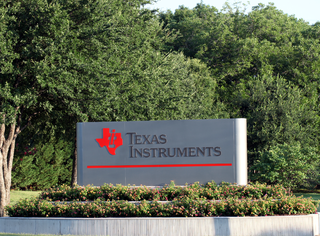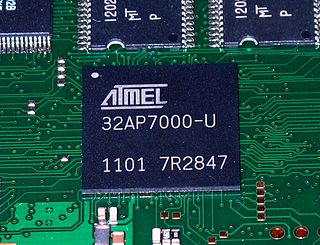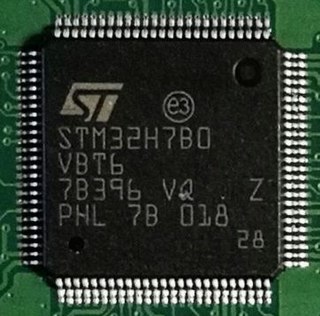
Texas Instruments Incorporated (TI) is an American multinational semiconductor company headquartered in Dallas, Texas. It is one of the top 10 semiconductor companies worldwide based on sales volume. The company's focus is on developing analog chips and embedded processors, which account for more than 80% of its revenue. TI also produces digital light processing (DLP) technology and education technology products including calculators, microcontrollers, and multi-core processors.

Cypress Semiconductor Corporation was an American semiconductor design and manufacturing company. It offered NOR flash memories, F-RAM and SRAM Traveo microcontrollers, PSoCs, PMICs, capacitive touch-sensing controllers, Wireless BLE Bluetooth Low-Energy and USB connectivity solutions.

FreeRTOS is a real-time operating system kernel for embedded devices that has been ported to 40 microcontroller platforms. It is distributed under the MIT License.
Atmel ARM-based processors are microcontrollers and microprocessors integrated circuits, by Microchip Technology, that are based on various 32-bit ARM processor cores, with in-house designed peripherals and tool support.

AVR32 is a 32-bit RISC microcontroller architecture produced by Atmel. The microcontroller architecture was designed by a handful of people educated at the Norwegian University of Science and Technology, including lead designer Øyvind Strøm and CPU architect Erik Renno in Atmel's Norwegian design center.
ARM9 is a group of 32-bit RISC ARM processor cores licensed by ARM Holdings for microcontroller use. The ARM9 core family consists of ARM9TDMI, ARM940T, ARM9E-S, ARM966E-S, ARM920T, ARM922T, ARM946E-S, ARM9EJ-S, ARM926EJ-S, ARM968E-S, ARM996HS. ARM9 cores were released from 1998 to 2006 and they are no longer recommended for new IC designs; recommended alternatives include ARM Cortex-A, ARM Cortex-M, and ARM Cortex-R cores.

PSoC is a family of microcontroller integrated circuits by Cypress Semiconductor. These chips include a CPU core and mixed-signal arrays of configurable integrated analog and digital peripherals.

Holtek Semiconductor is a Taiwan-based semiconductor design centre and provider with its headquarters and design operations based in the Hsinchu Science Park in Taiwan, and has sales offices located the United States and India. Holtek's design focus is in both 32-bit and 8-bit along with Touch microcontroller development, and as of 2022 the firm employed 631 employees. Holtek also designs and provides peripheral semiconductor products such as remote control, telecommunication, power management, computer peripheral, and memory devices. Holtek's device application area is concentrated in the consumer product field such as household appliances, computer peripheral products, remote controllers, leisure products, medical equipment as well as industrial controllers. Holtek microcontrollers are in home appliances including brands such as Philips, Siemens, Märklin and Japanese brands such as Futaba and Sony.
EFM32 Gecko MCUs are a family of mixed-signal 32-bit microcontroller integrated circuits from Energy Micro based on ARM Cortex-M CPUs, including the Cortex-M0+, Cortex-M3, and Cortex-M4.

The ARM Cortex-A9 MPCore is a 32-bit multi-core processor that provides up to 4 cache-coherent cores, each implementing the ARM v7 architecture instruction set. It was introduced in 2007.

Arm Holdings plc is a British semiconductor and software design company based in Cambridge, England, whose primary business is the design of central processing unit (CPU) cores that implement the ARM architecture family of instruction sets. It also designs other chips, provides software development tools under the DS-5, RealView and Keil brands, and provides systems and platforms, system-on-a-chip (SoC) infrastructure and software. As a "holding" company, it also holds shares of other companies. Since 2016, it has been majority owned by Japanese conglomerate SoftBank Group.

The ARM Cortex-M is a group of 32-bit RISC ARM processor cores licensed by ARM Limited. These cores are optimized for low-cost and energy-efficient integrated circuits, which have been embedded in tens of billions of consumer devices. Though they are most often the main component of microcontroller chips, sometimes they are embedded inside other types of chips too. The Cortex-M family consists of Cortex-M0, Cortex-M0+, Cortex-M1, Cortex-M3, Cortex-M4, Cortex-M7, Cortex-M23, Cortex-M33, Cortex-M35P, Cortex-M52, Cortex-M55, Cortex-M85. A floating-point unit (FPU) option is available for Cortex-M4 / M7 / M33 / M35P / M52 / M55 / M85 cores, and when included in the silicon these cores are sometimes known as "Cortex-MxF", where 'x' is the core variant.

STM32 is a family of 32-bit microcontroller integrated circuits by STMicroelectronics. The STM32 chips are grouped into related series that are based around the same 32-bit ARM processor core: Cortex-M0, Cortex-M0+, Cortex-M3, Cortex-M4, Cortex-M7, Cortex-M33. Internally, each microcontroller consists of ARM processor core(s), flash memory, static RAM, debugging interface, and various peripherals.

LPC is a family of 32-bit microcontroller integrated circuits by NXP Semiconductors. The LPC chips are grouped into related series that are based around the same 32-bit ARM processor core, such as the Cortex-M4F, Cortex-M3, Cortex-M0+, or Cortex-M0. Internally, each microcontroller consists of the processor core, static RAM memory, flash memory, debugging interface, and various peripherals. The earliest LPC series were based on the Intel 8-bit 80C51 core. As of February 2011, NXP had shipped over one billion ARM processor-based chips.

The Proteus Design Suite is a proprietary software tool suite used primarily for electronic design automation. The software is used mainly by electronic design engineers and technicians to create schematics and electronic prints for manufacturing printed circuit boards.

Apache Mynewt is a modular real-time operating system for connected Internet of things (IoT) devices that must operate for long times under power, memory, and storage constraints. It is free and open-source software incubating under the Apache Software Foundation, with source code distributed under the Apache License 2.0, a permissive license that is conducive to commercial adoption of open-source software.
GigaDevice Semiconductor is a Chinese NOR flash memory designer. It also produces microcontrollers, some of them are based on the ARM architecture, and other on the RISC-V architecture.
In computing, autonomous peripheral operation is a hardware feature found in some microcontroller architectures to off-load certain tasks into embedded autonomous peripherals in order to minimize latencies and improve throughput in hard real-time applications as well as to save energy in ultra-low-power designs.












